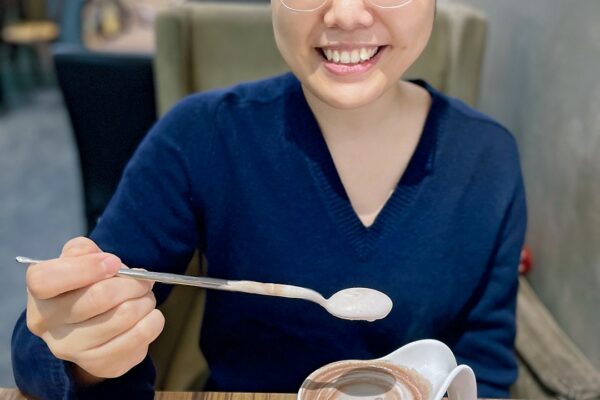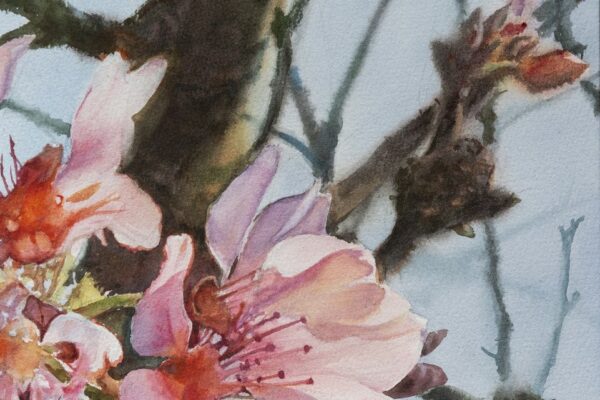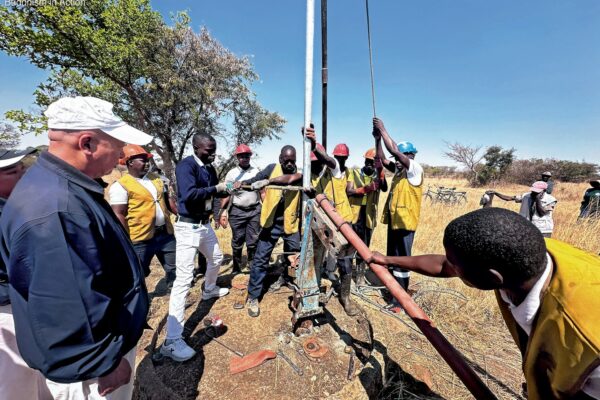By Lim Li Tan
Abridged and translated by Wu Hsiao-ting
Photo by Sam Pin Fook
When his mother fell ill, Ho Gwo Fuang suffered from much anxiety and fear. That experience led him to become a medical doctor. He knows firsthand what it feels like when family members become sick. “When patients and family members feel helpless, a doctor’s efforts in bringing them peace of mind are well spent,” said the physician.
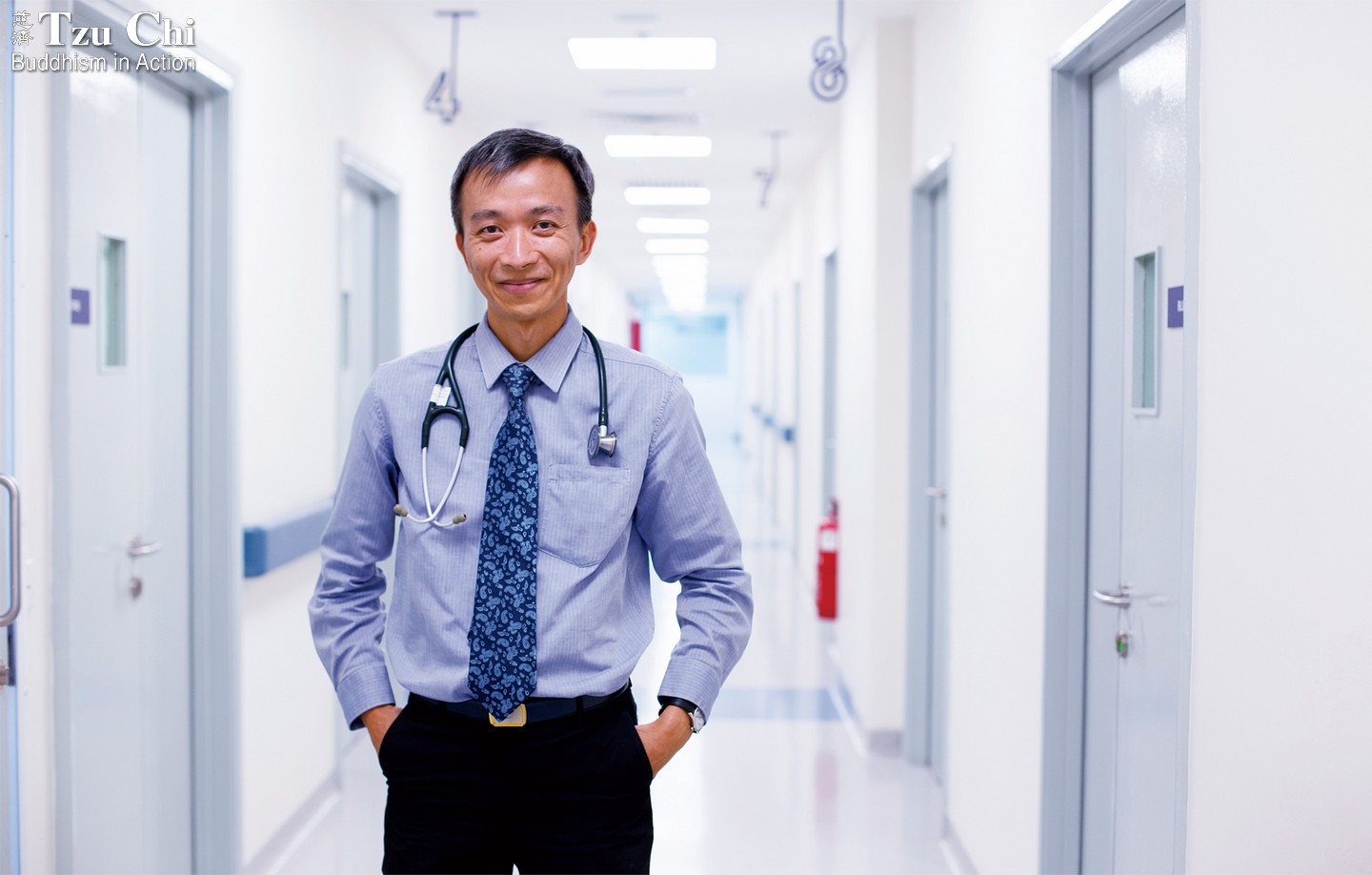
A comfortable, neat room housed several single leather sofa chairs in the Department of Clinical Oncology at the University of Malaya Medical Centre in Kuala Lumpur, Malaysia. The patients in that room looked like they had regular IV drips running into their arms, but they were actually receiving chemotherapy. Dr. Ho Gwo Fuang (何國煌) entered the room and walked towards one of the patients. Once at her side, he greeted her and gently asked her how she was doing, and then scheduled the next round of treatment with her.
Not long after that, his cell phone rang. He was needed in the ward for an emergency, so he rushed directly there. One of his patients had just undergone a high-risk operation to have a tumor removed and he was scheduled to be discharged from the hospital in two weeks. However, an emergency condition took his life. Ho sent a message to the patient’s wife from his cell phone, informing her of the situation, but the wife didn’t respond.
“I can understand how she’s feeling—at not being there when her husband passed,” he said, his eyes reddening with tears. His empathy for the patient’s family member was obvious.
Barely had he finished his words before a nurse handed him a document. He had no time to dwell on his sorrow. He didn’t believe that being sad helped things anyway. As a clinical oncologist, he had to quickly collect himself so that he would be ready to handle the next thing that needed his attention. He had to cultivate a calm and undivided presence of mind to cope with his busy day and his highly demanding work.
Experience as a patient’s family member
Ho is only 47, but he seems to have more grey hair than most people his age. His eyes shine when he talks about his work for cancer patients. He said that he had wanted to be a teacher growing up, until his mother took seriously ill when he was a tenth grader. She was at first diagnosed with cancer. After many tests, it was determined the initial diagnosis was a false alarm, but by the time they realized she had been misdiagnosed, the entire family had suffered through a lot of agony. That experience steered Ho to a career in medicine, with a focus on cancer.
“When my mother fell ill,” Ho remarked, “I realized how much anxiety a patient’s family goes through and what a tribulation the whole experience is for them. It’s especially hard when you know nothing about the illness. You feel very apprehensive and helpless.”
One day at the door of the hospital, he ran into the doctor who had performed the medical imaging on his mother. He jumped at the opportunity to ask the doctor’s opinion about his mother’s condition.
After that short conversation with the physician—which couldn’t have lasted more than 20 seconds—Ho felt all his anxiety dissipate. “It made me realize how much a doctor can influence the moods of a patient and their family,” he recalled. “If, in the process of treatment, a doctor can spend a little effort on bringing stability and peace of mind to a patient and their family, especially when the latter are feeling helpless, such effort will be well spent.” The young Ho pledged in his heart to become someone who could help others in this same way.
Ho was born in Beaufort, Sabah, in 1973, the sixth among eight children. His father was a school principal and his mother a homemaker. His family was poor when he was small. He performed well academically as a student, and he worked hard to become a medical doctor after his mother fell ill. After he graduated from high school, he went to the United Kingdom to study on a scholarship.
He graduated with a degree in Medical Science from the University of St Andrews, Scotland, in 1995. Then in 1998, he gained entrance into the Medical School of the University of Manchester to further his medical studies for a few years. He obtained a Certificate for Completion of Specialist Training in 2007. His area of expertise was oncology.
Renouncing a high-paying career in the UK, he returned to Malaysia and became a clinical oncologist and lecturer at the University of Malaya Medical Centre.
How Buddhism can benefit you
Ho decided to join a government hospital because he wanted to serve poorer patients and help train younger oncologists. Even though private hospitals have tried to lure him away with generous offers over the years, he isn’t tempted at all. He knows full well that if he works at a private hospital, he won’t be able to fulfill his wish of serving underprivileged patients.
His desire to help others led him to join the Tzu Chi International Medical Association (TIMA). Invited by Tzu Chi volunteer Angie Ng (黃淑瓊), Ho started taking part in TIMA free clinics in 2008. Some time later, he had a satellite dish installed at home and began watching Tzu Chi’s Da Ai TV. That deepened his understanding of Tzu Chi and exposed him to Buddhism.
Ho said that there aren’t that many free clinic events a year, so the number of patients he serves is limited. However, his volunteer work has had a major impact on him because it introduced him to Buddhism.
Ho used to have no religious faith, and he thought that Buddhism was just superstition. It was Master Cheng Yen’s sermons that changed his thinking. If he returns home from work early enough, he generally turns on the TV at 9 p.m. and watches a rerun of “Wisdom at Dawn,” a program that broadcasts Master Cheng Yen’s Dharma talks.
“The Master’s teachings are very applicable in life,” Ho observed. “They’re not esoteric. They’re all about fundamental life principles. She says that we should walk the Bodhisattva Path and go among people to help others. I believe that, because only then will we be able to make the most out of our lives.”
The doctor is grateful to the Master for leading him to the path of Buddhism and helping him cultivate his wisdom-life. He said that she has taught him to live in the moment instead of dwelling on the past or worrying about the future. This has greatly helped reduce his worries.
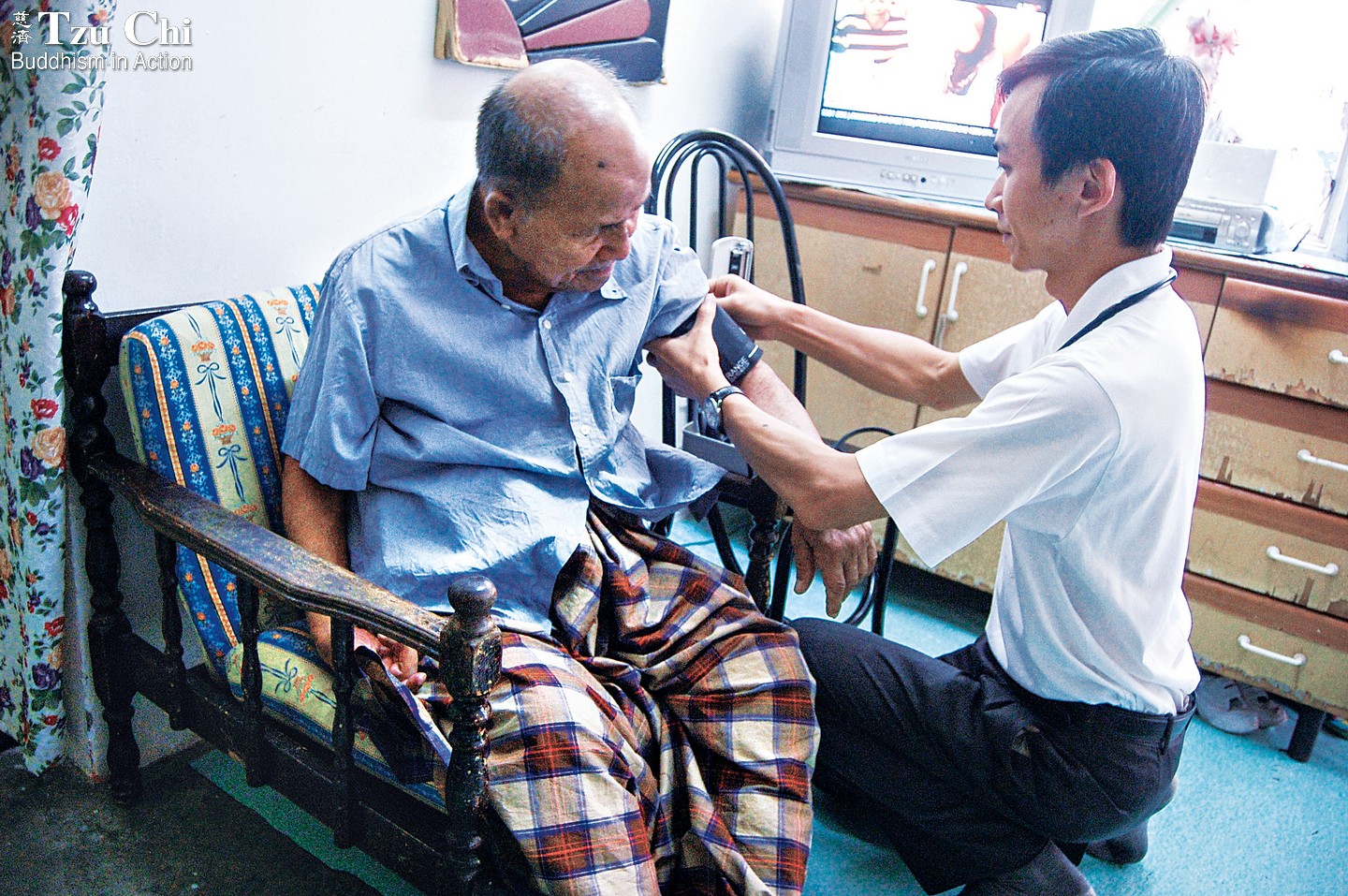
Though his medical work keeps him busy, Dr. Ho Gwo Fuang volunteers whenever he can. TIA YEE LING
Ho Gwo Fuang serves as a culinary volunteer at an event during which TIMA members in Malaysia share Tzu Chi medical values and philosophies with medical students. CHAN TUCK MENG
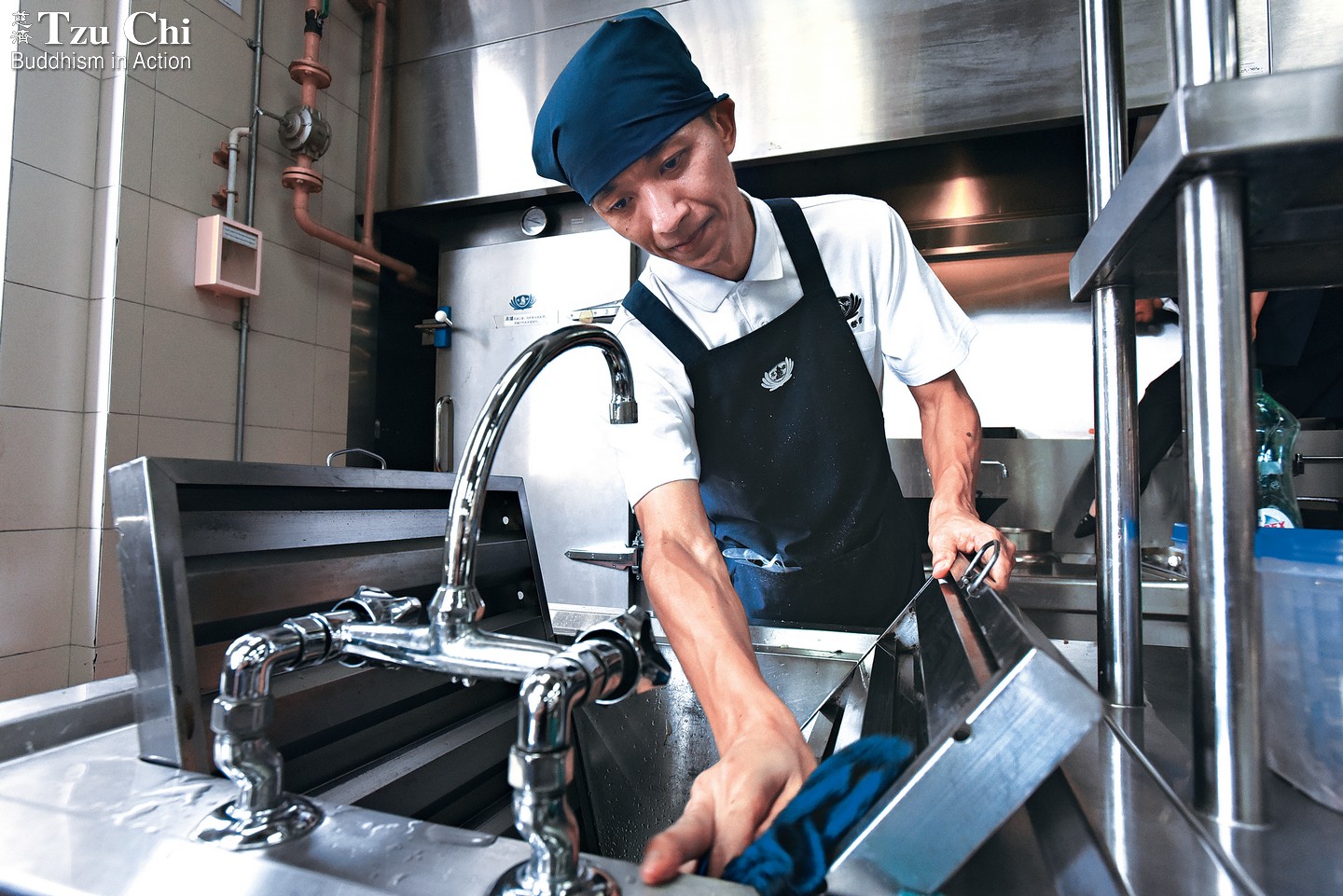
Humility helps one grow in wisdom
The Chinese New Year holiday of 2018 was a challenging time for Ho. He learned just before the New Year that his father had lost his voice, so he took him to a doctor when he returned to his hometown for the holiday. The doctor diagnosed his father with esophageal cancer. Ho knew that this kind of cancer was difficult to treat, even more so because his father was already in his 70s and would have a hard time completing the course of treatment.
Chinese New Year was just two days away, and Ho’s siblings were all returning home for the celebration. After some thought, he decided to keep the doctor’s diagnosis a secret and wait until after the New Year to take his father to the University of Malaya Medical Centre for further examination.
During the New Year, he occasionally thought about his dad’s illness, but he didn’t let it bother him too much, and instead he was determined to have a great time with his family. “I could have kept thinking about it,” he explained. “I could have obsessed over how my father’s treatment would go. But none of that would have helped. It wouldn’t have helped me, and it wouldn’t have helped my father. If I had let the matter be known, it would have affected everyone’s mood, and the New Year would have been a less happy time.” He felt that it was best to put the matter temporarily aside.
Later, when his father underwent further examination, the whole matter turned out to be a false alarm. If Ho had let himself agonize about it earlier, all that worrying would have been for nothing.
“When you practice Buddhism, you’re the first one to benefit,” Ho pointed out. “You’ll know better how to respond in challenging circumstances.” Despite being highly educated, he knows how important it is to stay humble too. He knows that an arrogant, self-important person will never grow in wisdom. Wisdom can only be inspired in a humble person. He compared growing in wisdom to filling a cup of water: “You need to pour some water out of a cup before it can take in any more, but it’s best to empty the cup completely.”
One’s homework in life
The Buddha’s teachings embody wisdom distilled from life’s experiences and universally hold true. Ho would be happy to share his understanding of the Enlightened One’s wisdom with his patients, but with so many patients to take care of, it is beyond him to do much in this respect.
He illustrated this point with an example. “A patient was diagnosed with stage-four nasopharyngeal cancer. I would have liked to guide and console him to help him feel better, but how could I have gotten my limited understanding of the Buddha’s teachings across to him in ten or 20 minutes? I think it’d be best if everyone could enrich themselves whenever they can and so be ready when life throws challenges their way.”
Four years ago, Dr. Eddie Chan Seng Hung (陳成亨), the convener of TIMA Kuala Lumpur and Selangor, invited Ho to train to become a certified Tzu Chi volunteer. Ho hesitated to say yes at first because he was worried he wouldn’t be able to set aside the time in his busy schedule. He only decided to go for it with the convener’s encouragement.
Ho recalled with a smile that he struggled every time a training class was coming up. “Should I go this time or not?” he’d wrestle with himself. His struggles notwithstanding, he admitted that he learned a lot and came to know many good people through those training sessions. He successfully completed two years of training and received his certification in 2018.
The physician said that he still has a lot of personal improvements to make—his temper, especially. He feels that he should be more patient and avoid lashing out at others. He quoted Master Cheng Yen: “If you have a bad temper and speak rudely to others, then no matter how good your heart is, you are not a decent person.” Ho uses those words to constantly remind himself to be more pleasant and agreeable towards others.
“Our physical forms will disappear from this world one day,” Ho said. “But now that I’ve become the Master’s disciple and formed a karmic connection with her, I’m not worried about getting lost in my future life and not being able to find the path that will lead me to her.” He feels that the Master has made the Buddha’s teachings more accessible and pointed out a way that everyone can follow.
“When you truly realize the spirit and guiding principles of our group,” he observed, “you will not complain when things do not go your way. You can even influence people around you for the better and help decrease disputes. We become the Master’s disciples to create a beautiful world. We need more like-minded people to work together to reach that goal.”
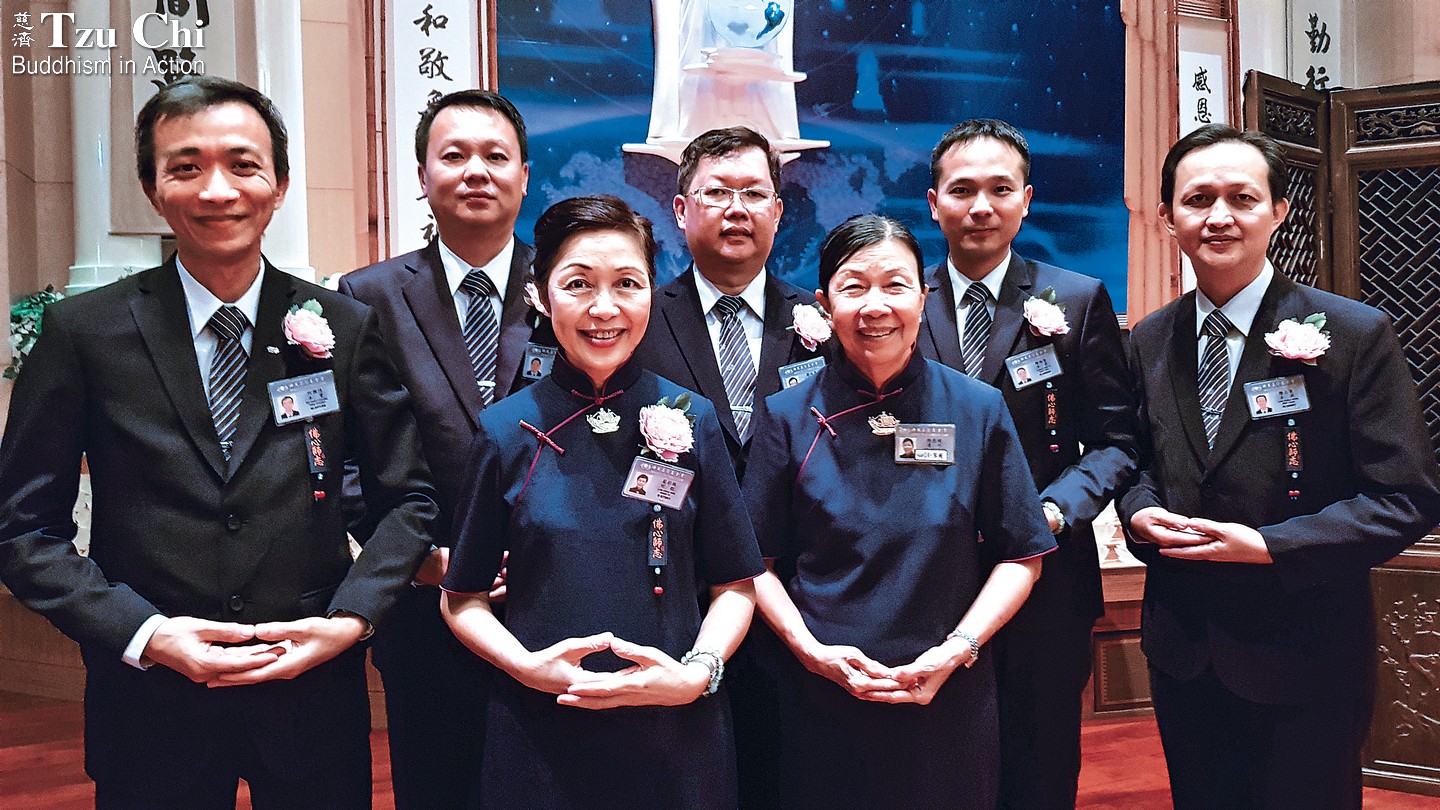
Ho (far left) and several other members of TIMA Kuala Lumpur and Selangor visited Taiwan and received their volunteer certifications from Master Cheng Yen in November 2018. COURTESY OF YAP PET YEE

